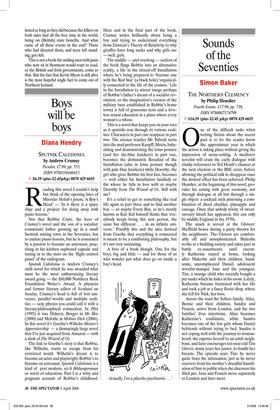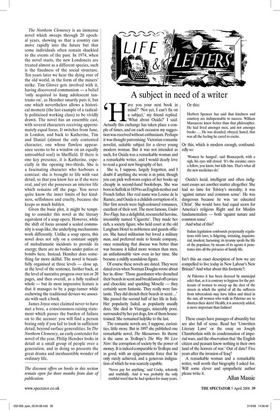Sounds of the Seventies
Simon Baker
THE NORTHERN CLEMENCY by Philip Hensher Fourth Estate, £17.99, pp. 738, ISBN 9780007174799 ✆ £14.39 (plus £2.45 p&p) 0870 429 6655 One of the difficult tasks when writing fiction about the recent past is to let the reader know the approximate year in which the action is taking place without giving the impression of scene-setting. A mediocre novelist will cram the early dialogue with clunky references to Ted Heath’s chances at the next election or the BSE crisis, before allowing the political talk to disappear once the desired effect has been achieved. Philip Hensher, at the beginning of this novel, provides his setting with great economy, not through dialogue at all but through a single object: a cocktail stick pinioning a combination of diced cheddar, pineapple and sausage. Once that unholy trinity of sweetsavoury kitsch has appeared, this can only be middle England in the 1970s.
The snack is served at the Glovers’ Sheffield house during a party thrown for the neighbours. The Glovers are comfortably off and unsophisticated. Malcolm works at a building society and takes part in battle re-enactments; until recently Katherine stayed at home, looking after Malcolm and their children, handsome, uncomplicated Daniel, adolescent novelist-manqué Jane and the youngest, Tim, a strange child who recently bought a pet snake which he hides in his room. Lately, Katherine became frustrated with her life and took a job at a fancy florist shop, where she fell for Nick, her boss.
Across the road the Sellers family, Alice, Bernie and their children, Sandra and Francis, arrive from London, and the two families’ lives intertwine. Alice becomes Katherine’s confidante, while Sandra becomes one of the few girls whom Daniel befriends without trying to bed. Sandra is not coping well with the journey to womanhood; she exposes herself to an adult neighbour, and later encourages ten-year-old Tim Glover, many years her junior, to fondle her breasts. The episode scars Tim: he never quite loses the infatuation, just as he never recovers from his mother’s dreadful humiliation of him in public when she discovers his illicit pet. Jane and Francis move separately to London and later meet. The Northern Clemency is an immense novel which sweeps through 20 epochal years, showing us that a country can move rapidly into the future but that some individuals often remain shackled to the events of the past. In 1974, when the novel starts, the new Londoners are treated almost as a different species, such is the fixedness of the social structure. Ten years later we hear the dying roar of the old world, in the form of the miners’ strike. Tim Glover gets involved with it, having discovered communism — a belief ‘only acquired to hang adolescent tantrums on’, as Hensher smartly puts it, but one which nevertheless allows a historical moment (the last example of a radically politicised working class) to be vividly drawn. The novel has an ensemble cast, with several characters receiving approximately equal focus. It switches from Jane, in London, and back to Katherine, Tim and Daniel (almost the only contented character, one whose flawless appearance seems to be a window on an equally untroubled soul) in Sheffield. If there is one key presence, it is Katherine, especially in the opening two-thirds. She is a fascinating character who harbours a contrast: she is brought to life with vast detail, so that you know her as if she were real, and yet she possesses an interior life which remains off the page. You never quite know the inner limits of her kindness, selfishness and cruelty, because she keeps so much hidden.
Given the basic plot, it might be tempting to consider this novel as the literary equivalent of a soap opera. However, while the shift of focus around a sealed community is soap-like, the underlying mechanisms work differently. Unlike a soap opera, this novel does not rely on a constant supply of melodramatic incidents to provide its energy; there are no bodies under patios or bombs here. Instead, Hensher does something far more skilful. The novel is beautifully organised at three levels — close up, at the level of the sentence, further back, at the level of narrative progress over ten or 20 pages, and then overall, as a fully realised whole — but its most impressive feature is that it manages to be a page-turner while eschewing the traditional devices we associate with such a book.
James Joyce once claimed never to have met a bore, a consciousness-raising statement which passes the burden of failure on to the accuser: you will find a person boring only if you fail to look in sufficient detail, beyond surface generalities. In The Northern Clemency, an early contender for novel of the year, Philip Hensher looks in detail at a small group of people over a generation, and in doing so presents the great drama and inexhaustible wonder of ordinary life.
The discount offers on books in this section remain open for three months from date of publication.



































































 Previous page
Previous page